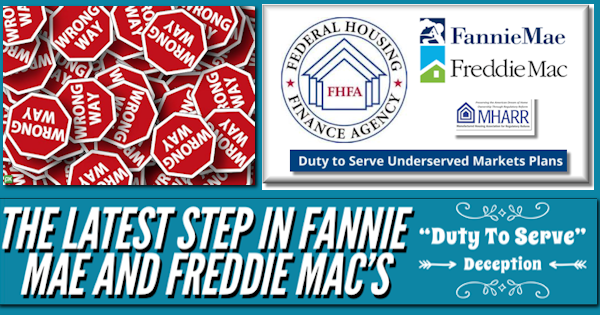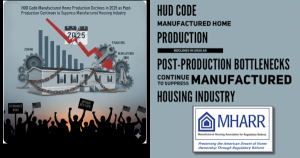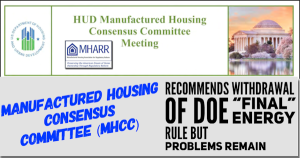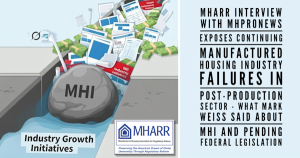The Latest Step in Fannie Mae and Freddie Mac’s “Duty To Serve” Deception

The latest step in the ongoing deception that constitutes the supposed “implementation” of the Duty to Serve Underserved Markets (DTS) mandate of the Housing and Economic Recovery Act of 2008 (HERA), unfolded on May 18, 2021, when the Federal Housing Finance Agency (FHFA) published the 2022-2024 DTS Plans proposed by mortgage giants Fannie Mae and Freddie Mac. These plans ostensibly address DTS initiatives in relation to the three statutorily-prescribed underserved markets – manufactured housing, rural housing and affordable housing preservation – for the next incremental period following the Enterprises’ initial 2018-2020 DTS Plans and the 2021 Plan supplements filed and approved by FHFA last year.
The most striking aspect of both proposed plans in relation to federally-regulated manufactured housing, is their complete omission of any programs, initiatives, or activities of any kind designed to provide or advance either securitization and/or secondary market support for the manufactured housing personal property (i.e., chattel) loans that constitute nearly 80% of the HUD Code manufactured housing consumer lending market for new home purchases. The latest proposed plans thus include – for their entire coverage period – absolutely no proposed chattel loan purchases, no chattel loan “pilot programs,” no chattel loan data or information gathering, no “education,” no “engagement,” or any other activity of any kind. This will leave the vast majority of mainstream manufactured housing consumers completely unserved, in direct violation of the DTS mandate.
Consequently, after more than a decade (2008-2021) of peddling a complete fiction and phony narrative to FHFA, Congress, consumers and the industry regarding their supposed interest in ultimately serving the manufactured housing personal property market – which is specifically targeted for support by the DTS provision – the 2022-2024 proposed DTS Plans finally expose both Enterprises’ baseless rejection of DTS in relation to the overwhelming majority of the manufactured housing market and manufactured housing consumers.
Indeed, the phenomenal arrogance underlying the Enterprises’ rejection of a direct congressional mandate, is on full display in the Freddie Mac 2022-2024 Plan. In part, that Plan states: “For the 2022-2024 Plan cycle, Freddie Mac will devote our resources to supporting the real property manufactured housing market…. We will not pursue the purchase and securitization of personal property loans on MH. With nearly two-thirds of personal property MH borrowers owning both the land and the home, our focus will continue to be on increasing the industry’s understanding of the beneficial financing and liquidity offered in the real-property space.” (See, Proposed Freddie Mac 2022-024 DTS Plan at p. MH6) (Emphasis added).
As MHARR has explained in previous DTS comments, DTS was designed by Congress to fundamentally change Fannie Mae and Freddie Mac’s approach to mainstream manufactured housing. Put differently, it was adopted to change them – the Enterprises – and their view of, approach to, and policies regarding market-significant support for traditional manufactured housing. Instead, though, Fannie Mae and Freddie Mac (with the blessing of FHFA, which presents yet another issue in itself) have sought to turn DTS on its head, misusing their DTS Plans in an indefensible and inexcusable effort to change the fundamental character of manufactured housing and its use by consumers. This first took the form of providing preferential treatment for “MH Advantage” and “ChoiceHome” manufactured homes which, according to Fannie and Freddie, were “more like” the site-built homes they prefer to deal with. Given the failure of that sop to the industry’s largest corporate conglomerates, which has been – and continues to be – a conspicuous marketplace fiasco, the 2022-2024 proposed DTS plans have simply devolved into an unvarnished campaign to force the industry – and more importantly, the supposedly misinformed and misunderstanding 80% of manufactured housing consumers – into the “real-property space” where Fannie and Freddie would prefer them to be.
This “let them eat cake” approach is not “serving” an existing – and crucial – affordable housing market, so much as it is a bad faith effort to avoid serving that market as it currently exists, while simultaneously seeking to transform it into something entirely different, that consumers have consistently demonstrated they do not want.
As such, this bad faith action should and must be rejected by FHFA, as MHARR will assert in the comments that it will file in this matter. Those comments, as per MHARR’s usual practice, will be filed in advance of the comment deadline so that they can be referenced by other interested parties. For those who wish to submit written comments in this matter, those comments must be filed by July 16, 2021. In addition, FHFA has announced a further “listening session” with regard to the proposed 2022-2024 DTS Plans, which is currently scheduled for July 14, 2021. Details regarding registration for the “listening session” are contained in the attached notice.
Duty to Serve Proposed 2022-2024 Underserved Markets Plans Now Available
Now Available – The Enterprises’ proposed Underserved Markets Plans for 2022-2024 are now available on the DTS website. The 60-day public input period begins today and will end on July 16, 2021. You may now submit comments using the Public Input section on the DTS website home page. The links to the request for input, the public input page, and the Enterprises’ proposed Plans can be found below:
- Request for Input
- Public Input Page
- Fannie Mae Proposed 2022-2024 Underserved Markets Plan
- Freddie Mac Proposed 2022-2024 Underserved Markets Plan
In addition to written public comments, FHFA will accept verbal comments on the 2022-2024 Underserved Market Plans during our upcoming virtual listening sessions. The first session on Monday, July 12th will focus on Rural Housing, the second session on Tuesday, July 13th will focus on Affordable Housing Preservation, and the third session on Wednesday, July 14th will focus on Manufactured Housing. Each virtual listening session will begin at 1:00 PM EDT and conclude by 4:00 PM EDT. The registration link for the listening sessions can be found here.
Click here to see the press release announcing the DTS 2022-2024 Underserved Market Plans.
If you have any questions about the Duty to Serve program, please email DutyToServeStakeholders@fhfa.gov, and keep an eye out for additional program updates.
The latest step in the ongoing deception that constitutes the supposed “implementation” of the Duty to Serve Underserved Markets (DTS) mandate of the Housing and Economic Recovery Act of 2008 (HERA), unfolded on May 18, 2021, when the Federal Housing Finance Agency (FHFA) published the 2022-2024 DTS Plans proposed by mortgage giants Fannie Mae and Freddie Mac. These plans ostensibly address DTS initiatives in relation to the three statutorily-prescribed underserved markets – manufactured housing, rural housing and affordable housing preservation – for the next incremental period following the Enterprises’ initial 2018-2020 DTS Plans and the 2021 Plan supplements filed and approved by FHFA last year.
The most striking aspect of both proposed plans in relation to federally-regulated manufactured housing, is their complete omission of any programs, initiatives, or activities of any kind designed to provide or advance either securitization and/or secondary market support for the manufactured housing personal property (i.e., chattel) loans that constitute nearly 80% of the HUD Code manufactured housing consumer lending market for new home purchases. The latest proposed plans thus include – for their entire coverage period – absolutely no proposed chattel loan purchases, no chattel loan “pilot programs,” no chattel loan data or information gathering, no “education,” no “engagement,” or any other activity of any kind. This will leave the vast majority of mainstream manufactured housing consumers completely unserved, in direct violation of the DTS mandate.
Consequently, after more than a decade (2008-2021) of peddling a complete fiction and phony narrative to FHFA, Congress, consumers and the industry regarding their supposed interest in ultimately serving the manufactured housing personal property market – which is specifically targeted for support by the DTS provision – the 2022-2024 proposed DTS Plans finally expose both Enterprises’ baseless rejection of DTS in relation to the overwhelming majority of the manufactured housing market and manufactured housing consumers.
Indeed, the phenomenal arrogance underlying the Enterprises’ rejection of a direct congressional mandate, is on full display in the Freddie Mac 2022-2024 Plan. In part, that Plan states: “For the 2022-2024 Plan cycle, Freddie Mac will devote our resources to supporting the real property manufactured housing market…. We will not pursue the purchase and securitization of personal property loans on MH. With nearly two-thirds of personal property MH borrowers owning both the land and the home, our focus will continue to be on increasing the industry’s understanding of the beneficial financing and liquidity offered in the real-property space.” (See, Proposed Freddie Mac 2022-024 DTS Plan at p. MH6) (Emphasis added).
As MHARR has explained in previous DTS comments, DTS was designed by Congress to fundamentally change Fannie Mae and Freddie Mac’s approach to mainstream manufactured housing. Put differently, it was adopted to change them – the Enterprises – and their view of, approach to, and policies regarding market-significant support for traditional manufactured housing. Instead, though, Fannie Mae and Freddie Mac (with the blessing of FHFA, which presents yet another issue in itself) have sought to turn DTS on its head, misusing their DTS Plans in an indefensible and inexcusable effort to change the fundamental character of manufactured housing and its use by consumers. This first took the form of providing preferential treatment for “MH Advantage” and “ChoiceHome” manufactured homes which, according to Fannie and Freddie, were “more like” the site-built homes they prefer to deal with. Given the failure of that sop to the industry’s largest corporate conglomerates, which has been – and continues to be – a conspicuous marketplace fiasco, the 2022-2024 proposed DTS plans have simply devolved into an unvarnished campaign to force the industry – and more importantly, the supposedly misinformed and misunderstanding 80% of manufactured housing consumers – into the “real-property space” where Fannie and Freddie would prefer them to be.
This “let them eat cake” approach is not “serving” an existing – and crucial – affordable housing market, so much as it is a bad faith effort to avoid serving that market as it currently exists, while simultaneously seeking to transform it into something entirely different, that consumers have consistently demonstrated they do not want.
As such, this bad faith action should and must be rejected by FHFA, as MHARR will assert in the comments that it will file in this matter. Those comments, as per MHARR’s usual practice, will be filed in advance of the comment deadline so that they can be referenced by other interested parties. For those who wish to submit written comments in this matter, those comments must be filed by July 16, 2021. In addition, FHFA has announced a further “listening session” with regard to the proposed 2022-2024 DTS Plans, which is currently scheduled for July 14, 2021. Details regarding registration for the “listening session” are contained in the attached notice.
Duty to Serve Proposed 2022-2024 Underserved Markets Plans Now Available
Now Available – The Enterprises’ proposed Underserved Markets Plans for 2022-2024 are now available on the DTS website. The 60-day public input period begins today and will end on July 16, 2021. You may now submit comments using the Public Input section on the DTS website home page. The links to the request for input, the public input page, and the Enterprises’ proposed Plans can be found below:
- Request for Input
- Public Input Page
- Fannie Mae Proposed 2022-2024 Underserved Markets Plan
- Freddie Mac Proposed 2022-2024 Underserved Markets Plan
In addition to written public comments, FHFA will accept verbal comments on the 2022-2024 Underserved Market Plans during our upcoming virtual listening sessions. The first session on Monday, July 12th will focus on Rural Housing, the second session on Tuesday, July 13th will focus on Affordable Housing Preservation, and the third session on Wednesday, July 14th will focus on Manufactured Housing. Each virtual listening session will begin at 1:00 PM EDT and conclude by 4:00 PM EDT. The registration link for the listening sessions can be found here.
Click here to see the press release announcing the DTS 2022-2024 Underserved Market Plans.
If you have any questions about the Duty to Serve program, please email DutyToServeStakeholders@fhfa.gov, and keep an eye out for additional program updates.












